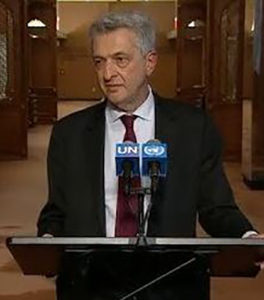UN Refugee compact adopted
The UN has endorsed an ‘historic’ non-legally binding global compact on refugees, marking the latest move by member states to support the rights of 258 million people  on the move worldwide.
on the move worldwide.
An overwhelming number of States in the UN General Assembly, 181, voted in favour of adopting the compact, with the US and Hungary opposing the move.
The Dominican Republic, Eritrea and Libya abstained. The UN Refugee Agency (UNHCR) Chief Filippo Grandi said the pact was “historic” and noted it was the first time the assembly has seen an agreement between states that acknowledges the need to work collectively for the rights of refugees.
“In this world of ours, which often turns it back to people in need, that has shamefully politicized even the pain of exile, that has demonised and continues to demonise refugees and migrants and sometimes even just foreigners, this compact, in synergy with the other compact, the compact on migration, can really represent tangibly, a new commitment to international cooperation,” Mr Grandi said at an event at the UN Headquarters in New York.
He said it represented “a new commitment to shared values of solidarity and the quest to just and sustainable solutions for disadvantaged people.”
This global compact for refugees, which is separate from the newly-adopted Global Compact for Migration, aims to strengthen the international response to large movements of refugees and their protracted situations, and was prompted by the historic 2016 New York Declaration for Refugees and Migrants, in which all 193 member states agreed that the protection of refugees should be a shared responsibility.
The declaration tasked the UNHCR with authoring the refugee compact, which came to fruition after 18 months of extensive consultations between the member states, experts, civil society, and refugees.
Just last week, the Global Compact for Migration was adopted by 164 Governments at an international conference in Marrakech, Morocco in a bid to support safe, orderly and regular migration.
Australia was among a group of countries that have not adopted the migration compact.
Approximately 85 per cent of refugees live in developing countries, according to the UNHCR, where services are already strained.
Though donors have been generous in financing aid to refugees, Mr Grandi said that the disproportionate burden on middle and low-income countries is evident, and leaves us “at the mercy of economic downturns.”
Mr Grandi urged nations to re-evaluate the way refugees are supported to be more inclusive.
“The image that we have of refugees is the refugee camp. We want to get away from that,” he said.
Both the Global Compact on Migration and Global Compact on Refugees, come at a time of heightened division across the world and within societies, Mr Grandi said.
“In recent years we have seen a contagion of closed borders, contrary to national refugee and human rights law. Millions of refugees are facing years in exile, or risking their lives on dangerous journeys to an uncertain future. And that is why this global compact is such an important step,” he said.
The wording of the compact urges nations to “shoulder their responsibilities toward refugees, to find solutions that respect their human rights, to provide them with hope, and to recognise the legal responsibility to protect and to support them”.
The compacts are aligned with the UN’s ambitious Sustainable Development Goals.












